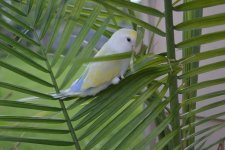veimar
New member
- Feb 5, 2014
- 1,150
- 4
- Parrots
- gcc Parry; lovebird Coco; 3 budgies (Tesla, Franky and Cesar); cockatiel Murzik, red rump parakeet girl Onyx
I just want to hear about female lovebird owners. How do you keep your bird happy without a mate?
I have an adorable and affectionate rare color lovie, and as she is maturing (she is around 10-12 mo old) I noticed she is getting more and more frustrated. One of my budgies was trying to mate with her for some time, but then chose my gcc as his "master". She is trying to make a nest and offers the budgies to mate with her. I'm just so sorry for her and I really want her to be happy bird. She loves me and my hubby, but thankfully doesn't perceive any of us as her "mate".
So I'm kinda thinking of getting a same color mate for her which could be difficult. I'm not afraid of committing to raise the chicks, but I don't want to loose her sweet qualities as a pet... She never bites and is very smart. Selling the birds wouldn't be a problem here - they are quite in demand.
I also wonder how difficult is to raise lovebirds and do they HAVE to be hand fed (I'm generally against hand feeding and find it cruel). I have a rescued parent raised cockatiel who wasn't handled until 2 years of age, and he is probably sweeter than some other hand raised birds (he is sitting on my chest and giving me kisses as I type this). I'm pretty sure the lovie I have was not hand fed as well. I'm thinking about co-parenting and handling the babies on daily basis so they become tame.
Please share your ideas and experience. Thank you!!!
I have an adorable and affectionate rare color lovie, and as she is maturing (she is around 10-12 mo old) I noticed she is getting more and more frustrated. One of my budgies was trying to mate with her for some time, but then chose my gcc as his "master". She is trying to make a nest and offers the budgies to mate with her. I'm just so sorry for her and I really want her to be happy bird. She loves me and my hubby, but thankfully doesn't perceive any of us as her "mate".
So I'm kinda thinking of getting a same color mate for her which could be difficult. I'm not afraid of committing to raise the chicks, but I don't want to loose her sweet qualities as a pet... She never bites and is very smart. Selling the birds wouldn't be a problem here - they are quite in demand.
I also wonder how difficult is to raise lovebirds and do they HAVE to be hand fed (I'm generally against hand feeding and find it cruel). I have a rescued parent raised cockatiel who wasn't handled until 2 years of age, and he is probably sweeter than some other hand raised birds (he is sitting on my chest and giving me kisses as I type this). I'm pretty sure the lovie I have was not hand fed as well. I'm thinking about co-parenting and handling the babies on daily basis so they become tame.
Please share your ideas and experience. Thank you!!!
